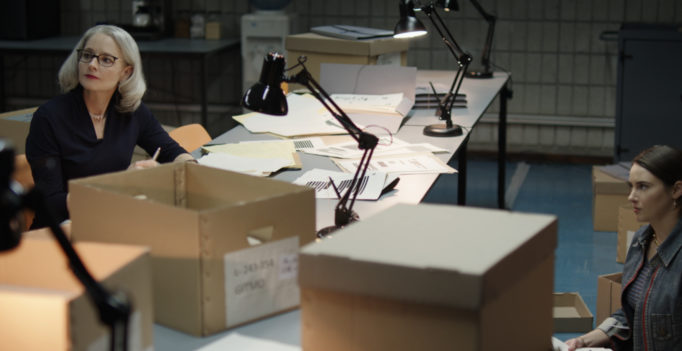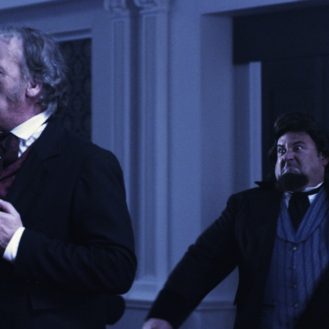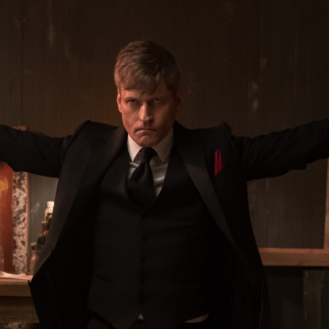By: Jolie Featherstone
Based on Mohamedou Ould Slahi’s best-selling memoir “Guantánamo Diary,” The Mauritanian details the harrowing true story of Slahi’s fight for freedom after being imprisoned without charge – or any solid evidence – by the US government in the wake of September 11.
After years of isolation and manipulation, Slahi (Tahar Rahim) is approached by defense lawyer Nancy Hollander (a Golden Globe-winning performance from Jodie Foster) and her associate, Teri Duncan (Shailene Woodley). They offer to represent him in a case against the US government. Although Slahi is initially wary of the offer, the three begin a long, winding road to justice. Classified documents, systemic barriers, and a reactionary rise of nationalism all impact the case. Matters are complicated further when a stoic military prosecutor, Lt. Colonel Stuart Couch (Benedict Cumberbatch) is assigned as the prosecuting attorney. Adding to the painful and complex situation, Lt. Colonel Couch’s best friend perished during the September 11 attacks as the co-pilot on the second plane to fly into the World Trade Centre. As Hollander and Couch dive deeper into the case in a race against time, details come to light and the legal maze continues to constrict and contort – with Slahi’s freedom hanging in the balance.
Directed by Kevin Macdonald (The Last King of Scotland), The Mauritanian is a well-oiled, classic political drama/thriller in the vein of Official Secrets (2019) and The Report (2019) – the latter making a great companion film to The Mauritanian. The film keeps the focus on Slahi’s personal journey, while also detailing the bureaucratic and socio-political barriers faced by the lawyers on both sides.
Though I’d read articles and watched documentaries about the monstrous, sanctioned human rights abuses conducted by US military personnel at Guantanamo Bay and Abu Ghraib, this film still taught me things that I wasn’t previously aware of. The scenes documenting Slahi’s capture, imprisonment, and torture are distressing. It is important to note that they are graphic, but they are not gratuitous. They are in service of sharing Slahi’s lived experience.
Slahi’s journey is the central thread running through the film. When it does move to either side of the thread, we join Hollander and Lt. Colonel Couch’s respective processes. Scenes where the two have a back-and-forth are interesting and add another layer of tension. One element that I wonder could have been better portrayed through the film’s structure is just how long Mr. Slahi was imprisoned for. The film could have better portrayed the full breadth of time and life taken from Mr. Slahi. Perhaps had the flashbacks of his detainment and imprisonment were arranged differently throughout the film’s running time, this could have been more emotionally articulated.
With quiet dignity and soulful eyes, Tahar Rahim delivers an engrossing performance. Indeed, the depth of emotion conveyed through one look alone begets compassion. Rahim lets us into the fear, anger, and loneliness – while also showing us glimmers of hope. Jodie Foster is formidable as the dogged, determined Nancy Hollander. In other hands, the script may have afforded Hollander a surface-level portrayal. Foster, though, brings nuanced emotion to this champion of human rights. Indeed, she recently took home the Golden Globe for Best Supporting Actress in a Motion Picture for her performance. Shailene Woodley brings a natural humanity to Teri. Her character grounds us in the complex reality of what many Americans, even ones who would consider themselves progressive, may have grappled with. Woodley’s Teri is a young professional who cares about human rights at a general level, but also has apprehension about taking on the project. Woodley conveys Teri as torn between wanting to believe the best about Slahi – yet conditional to his complete innocence. She struggles at times with the idea that Slahi should, at the very least, receive a fair trial and treatment even if he is guilty. Her conflict is understandable: we see Teri get physically assaulted by angry protesters who oppose her and Hollander’s work to get Mr. Slahi a fair trial. Her own family coldly tells us her that she is not welcome to their Thanksgiving gathering if she continues to work on the case. She has a pure and innocent concern for Slahi, yet she is also at the mercy of the political haze and anger surrounding the case which is fueled by the Islamaphobia and xenophobic paranoia following the events of September 11. Benedict Cumberbatch portrays Lt. Colonel Couch with warm compassion and care. A strong-and-silent type, we get a glimpse into the deep moral conflict he experiences – not only as prescribed from his work, but also from friends and family who are also grieving the loss of their dear friend, husband, and colleague.
As a film, The Mauritanian doesn’t break new ground stylistically or technically. I’d also wonder what the film could achieve had it focused more on showing rather than telling. It tends to stick to the facts and accounts without too much emotional or spiritual illustration. However, it succeeds in raising our awareness and empathy through the story of a man who went through inhuman, unimaginable horrors. Indeed, Slahi’s willingness to share his story underscores a simple truth that sometimes gets lost in the political hype of the day-to-day: people deserve basic human rights, period.
**********
Do You Tweet? Follow These Tweeple:
Jolie Featherstone: @TOFilmFiles





Be the first to comment